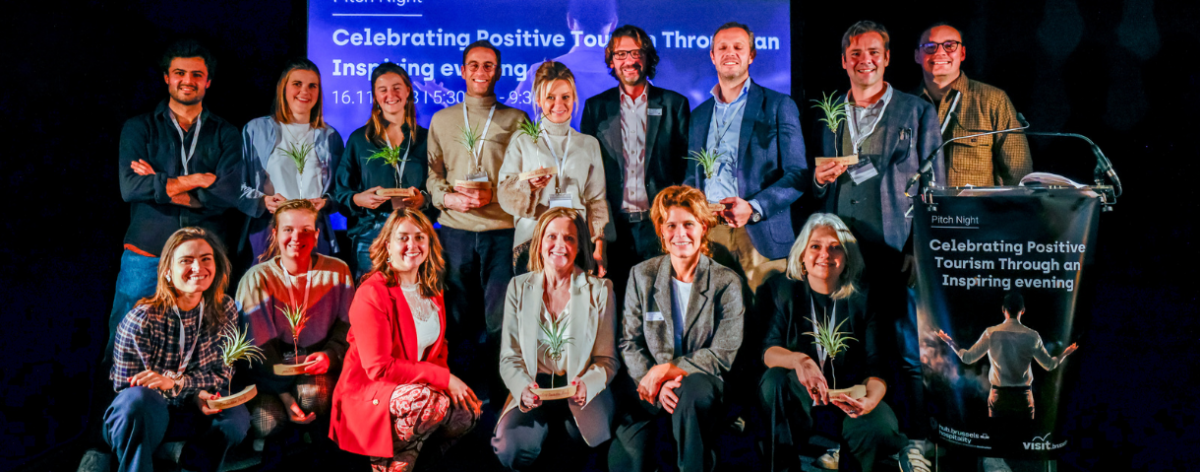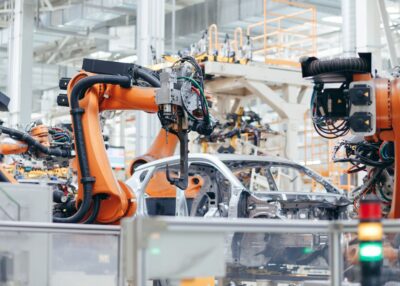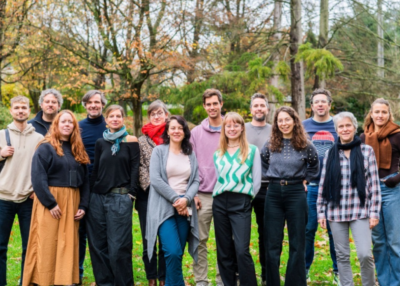
Brussels, a pioneer of positive tourism
Tourism is a major economic sector, accounting for 10% of the world’s GDP… and 8% of its greenhouse gas emissions. Can we travel without leaving a trace? Or better still, can tourism be a driving force for positive change in our society? We take a journey to the heart of our capital to look at its innovative, forward-looking initiatives.
Putting tourism and economic transition in the same sentence can sometimes sound like an oxymoron. Tourism is all too often synonymous with air travel, CO2 and sometimes heritage degradation. And yet, when we integrate other variables into the tourism economy, such as the contribution of the local population or better management of tourist flows, we tend to move towards more local and therefore more sustainable tourism. So we need to reverse the paradigm, making tourism a driver of change rather than an obstacle.
Because, when put to the right use, the visitor economy presents very real opportunities. “With 12% annual growth, this is the only sector that still accounts for a double-digit percentage of our national GDP, and is therefore a formidable driving force,” stresses Patrick Bontinck, CEO of visit.brussels. “But this economy has an impact and its players have a societal role to play.”
More local, more qualitative, better distributed
For Annelore Isaac, Deputy CEO of hub.brussels: “the aim is not to do without tourism, but rather to enhance its externalities.” Because tourism is a real social driver, creating thousands of non-relocatable jobs and encouraging creative innovation, in terms of inclusiveness, accessibility and sustainability.
But we must preserve and improve the lives of inhabitants, as set out in the Regional Economic Transition Strategy #ShiftingEconomy. The Brussels tourism ecosystem plans to make this sustainable goal a reality by 2028, through three missions:
- Include local populations in the definition of tourist visitors: encourage local visitors by promoting the capital’s accessibility (train, bus, etc.)
- Focus on duration rather than quantity: not attracting more tourists, but making them stay longer. One tourist staying six nights, rather than two tourists staying three nights, is an equivalent operation in economic terms, but much more economically virtuous (fewer sheets to wash, fewer products to throw away, fewer return trips, etc.). The longer the stay, the more the traveller will have to leave the beaten track and explore less touristy parts of the capital.
- Smooth out the waves of visitors: distribute tourist flows more evenly over the year, to limit – and decentralise – mass tourism and ensure a sustainable, regular income for the hospitality ecosystem, as some professions are entirely tied to the tourist seasons. This brings its share of temporary layoffs and job insecurity.
Nine Brussels companies spearhead positive tourism
We do not stress often enough that Brussels is definitely at the cutting edge when it comes to tourism innovation, with companies in the sector offering a wide variety of bold solutions that meet real needs. They also add a sustainable, responsible dimension.
An inclusive art gallery, a fair-trade restaurant, an anti-waste caterer: each of the nine initiatives listed below and pitched at the “Celebrating positive tourism” evening organised jointly by the hub.brussels hospitality cluster and visit.brussels on 16 November is committed to meeting one or more of the 17 United Nations Sustainable Development Goals: inclusivity, sustainability, mobility, innovation, accessibility, circularity, etc.
“Social and environmental exemplarity has become a criterion in its own right for accessing subsidies and support at the regional level,” explains Véronique Renard, coordinator of our hospitality.brussels cluster. The cluster provides coaching and networking for players in the cultural, tourism and events sectors in Brussels. “We are proud to support these pioneering Brussels initiatives on a national and international scale.“
Wheeltribe: a platform that connects people with reduced mobility with inclusive travel solutions.
Discoverent: a travel agency that reduces your environmental impact by offering trips to nearby destinations, responsible transport and local meals.
Edji Gallery: an art gallery that celebrates the diversity of the emerging international art scene, promotes gender equality and reduces inequalities by supporting artists from all backgrounds.
Raypath: a cleaning company that has developed an innovative solution for scrubbing large enclosed spaces using fewer resources and environmentally harmful products.
Sparks Meeting: a meeting place for innovation, sustainability and conviviality in the heart of Brussels.
Entropy: a restaurant that aspires to create a more circular and equitable food system, reducing social inequalities by donating profits to its non-profit organisation (Hearth project) and redistributing surpluses.
Belgobon: a catering service that fights food waste, promotes sustainable practices and uses modular cargo bikes for events.
e-carriages: a soft mobility project that will use electric carriages in the streets of central Brussels to promote authentic, environmentally-friendly tourism.
My Impact Tool: an innovative software tool that enables events companies to calculate the carbon impact of their events and makes a series of turnkey recommendations for reducing it.
More news:

After Audi: Brussels foreign trade in the first half of 2025
Posted on 28/01/2026
